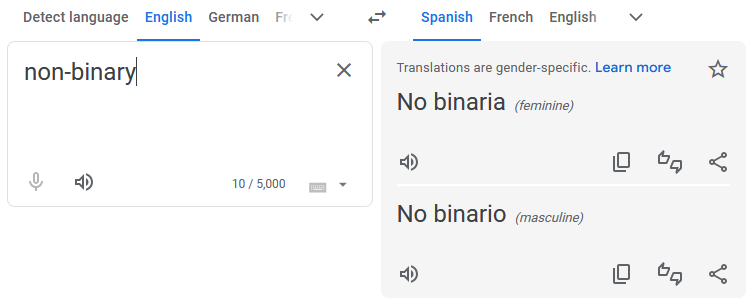this post was submitted on 29 Nov 2024
234 points (95.7% liked)
Linguistics Humor
1120 readers
3 users here now
Do you like languages and linguistics ? Here is for having fun about it
Share this community: [!linguistics_humor@sh.itjust.works](/c/linguistics_humor@sh.itjust.works)
Serious Linguistics community: !linguistics@mander.xyz
Rules:
- 1- Stay on Topic
Not about Linguistics, language, ways of communications - 2- No Racism/Violence
- 3- No Public Shaming
Shaming someone that could be identifiable/recognizable - 4- Avoid spam and duplicates
founded 2 years ago
MODERATORS
you are viewing a single comment's thread
view the rest of the comments
view the rest of the comments

But every single change does that?
Over here in Germany conservatives keep yelling about similar efforts. As it stands, the most popular gender inclusive variant for referring to a group of people has become "[masuline form]*innen"
Take the word "student" for instance
Since the generic masculine doesn't acknowledge non-binary or female people, the following variant has started to spread:
When talking, you can differentiate it from the term "Studentinnen" by replacing the * with a short break. You'd basically say "Student...innen".
Neither the *, nor this break is adhering to any established rules. But the main - or only - reason reactionaries oppose it is because they don't want to acknowledge non-binary people.
Well that's pretty much how Spanish works. We have estudiante but that normally ends with -e so we'll use alumno as an example:
El alumno - single masculine
La alumna - single feminine
Los alumnos - multiple masculine or mixed group. As long as there's at least one guy its masculine
Las alumnas - multiple feminine
So saying something like Les alumnes (seems like French lol) can sound more neutral than Los alumnos despite not being officially correct because los has an implied masculine connotation
Still, it would break grammar rules similar to the -x ending, right? Although from my limited Spanish knowledge the -x ending would require some explanation on how to pronounce it, just like the German *-variant. The -e might be more intuitive though.
But from what I've seen on the internet, by far the vast majority of criticism of the -x variant are immediately followed by some right-wing talking point, which is why I'm somewhat cautious about more appropriate criticism.
In German, another variant, though considerably less popular, for referring to people in a gender neutral fashion is by "Englishifying" it and referring to everyone the same by appending a -y to the word stem.
Singular male/female/non-binary student? That's a Studenty now. A group of students? Studentys.
I hate to say it but this is my favorite variant because it gets rid of gender altogether in a concise way and sounds silly. Still, it too violates a shitton of rules - but what are rules, if not meant to be broken?
Spanish is a consonant vowel language. It's actually super nice because you can read aloud really fast since you don't have to finish reading the word before pronouncing it (something totally not possible in English). Ending a word in nx is such a non-natural change that it's not a grammar rule as much as a forcing of the Spanish tongue to alter its optimized path and pattern to something that is not part of it's vocal structure. That's typically why Spanish speakers I know mock Latinx as tone deaf American virtue signalling. Using an e at the end of a word is more compatible because Spanish avoids hard sounds at the end of words generally.
To the rest of the previous commenters point, switching to e doesn't even solve all of it because the language genderizes all its adjectives. Only an English tongue has the privilege of thinking modifying the noun is enough. And modifying the adjectives can lead to language overlap where adjectives might start to sound like other Spanish words and confuse contextual speaking (which is again, something English speakers take for granted because we have a glut of homonyms due to our very middled language history). It's akin to proposing an entire system of communication be broken for the sake of something that it was not built to accommodate. From the sound of it, it might be worth a trans lingua franca more than changing fundamental effective communication strategies. Basically creating a Swahili of gender awareness and then working to market it effectively so people use it when they need to regardless of language.